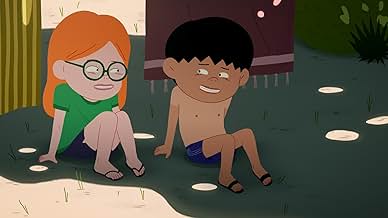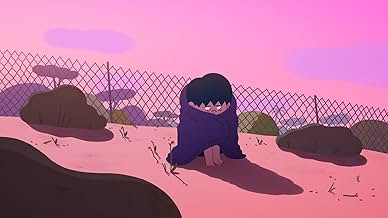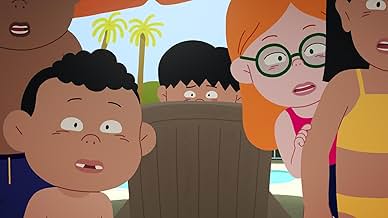"Yuck!" is one of those shorts that brilliantly blends simplicity with depth, offering a light narrative that's full of complex meanings about growing up, exploring one's emotions, and facing the first dilemmas of life in society. Loïc Espuche, the director, nails it by using the world of childhood and discovery in a visceral yet charming way. With what seems like a modest budget and simple 2D animation, the film stands out because of the strength of its story and the surprisingly natural performances of the young actors.
The premise of "Yuck!" starts with the typical innocence of childhood: a group of kids playing at a summer camp, enjoying the sun and the carefree spirit of summer. But soon, the plot takes an interesting turn, mixing youthful humor with a bit of reflection. Leo, the protagonist (played by Noé Chabbat), starts experiencing something pretty common but portrayed in a sensitive way: he begins to feel attracted to his friend Lucie (Katell Varvat), something he doesn't fully understand, leaving him conflicted, especially considering the environment he's in, where the mere idea of affection between adults is ridiculed.
What makes "Yuck!" fascinating isn't just Leo's discovery but the way the animation handles the fear and shame that many kids, especially pre-teens, start to feel when confronting their own emotions. At the same time, the film almost imperceptibly addresses prejudice and homophobia, something many people can relate to. The scene where two men try to kiss but quickly hide when they realize someone is watching is a delicate representation of insecurity about sexuality and the fear of judgment.
It's interesting how "Yuck!" keeps the tone light and playful while diving into heavier life issues like the fear of being judged or discomfort with one's own sexuality. Espuche's decision to make the characters' lips turn pink when they're about to kiss is a simple but powerful metaphor - what was once an invisible act becomes something tangible and impossible to hide. This transition from something harmless to something that requires courage marks the film in a really striking way.
The animation, though simple, has an engaging rhythm, and the 2D style contributes to the feeling of a dreamlike world that's also grounded. It's not a visually complex film, but its aesthetic has an irresistible quality that fits perfectly with the tone Espuche wants to convey. The fluidity of the movements and the characters' expressions are well done, which is key to conveying the energy and tensions of the story in a genuine way.
Speaking of the cast, the decision to use real children to voice the characters was a masterstroke. The dialogue feels natural and full of energy, something many animations, no matter how hard they try, can't quite capture with such sincerity. The voices of the young actors seem to transport the audience back to their own childhood, a time when the world was both simple and full of emotional complexity. The innocence of their lines hides a depth of feeling that later resonates in a reflection on acceptance and growth.
Overall, "Yuck!" leaves us with a sense of nostalgia for a time that will never return, but also with a powerful message that discovering who you are isn't something to be feared. Espuche manages to tackle themes like shame, identity, and courage, making the audience reflect on the universality of these feelings, no matter your age. The short is a true victory for animated cinema, showing that with a good script and a sharp eye, it's possible to create a deeply touching and relevant work without relying on complex effects or innovative visuals. It's a film that celebrates emotional honesty and makes us reflect on both the small and big moments of life.



















